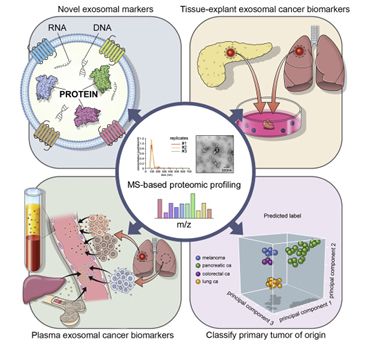Principal Investigator:
David C. Lyden, Professor of Pediatrics
Background & Unmet Need
- Pioneering work of Dr. Lyden showed that cancer cells secrete protein-rich EVPs (exosomes) that presage and prepare the metastatic niche
- Dr. Lyden and collaborators have analyzed 426 samples for protein content of EVPs from different sources (tumor/healthy samples; plasma; tissue explants, etc.)
- Significant differences between proteins in tissues and plasma of cancer vs healthy patients and cancer subtypes have been found, enabling a range of diagnostic and prognostic tests
- Unmet Need:
- Diagnosis of Cancer of Unknown Primary Origin (CUP; ca. 2-5% of all cancers; poor prognosis)
- Distinguishing malignant vs non-malignant growths (over 5M biopsies each year)
- Cancer screening of at-risk patients (>50)
Technology Overview
- The Technology: Plasma EVP extraction and MS analysis workflow for the detection of multiple cancer subtypes
- Biomarker sets distinguishing plasma of patients: tumor vs. non-tumor; cancer types; malignant vs. premalignant tumors
- PoC Data: Distinguishes plasma from patients with and without tumor with 95% sensitivity and 90% specificity
- Identifies primary tumors in plasma: breast, colorectal, lung, pancreatic cancer, mesothelioma
- Distinguishes malignant vs. premalignant patients (e.g., PDAC vs. IMPN; myelodysplasia vs. leukemia)
- Additional validation of the workflow is ongoing
Technology Applications
- CUP primary tumor identification to inform treatment strategy and prolong patient survival
- Malignant vs. premalignant test that replaces the need for invasive biopsies
- Screening test for rapid, early tumor detection
Technology Advantages
- Rapid, accurate, and non-invasive tests
- Fits into current clinical decision-making and delivers immediate value to physicians and patients
- Distinguishes plasma from patients with and without tumor with 95% sensitivity and 90% specificity
- Applicable to detection of numerous tumor types, including breast, colorectal, lung, pancreatic cancer, and mesothelioma

Figure 1: Overview of the EVP platform for diagnosis and prognosis of multiple cancer subtypes.
Publications
Resources
Intellectual Property
Contact Information

For additional information please contact
Brian Kelly
Director, Business Development and Licensing
Phone: (646) 825-2766
Email: bjk44@cornell.edu

